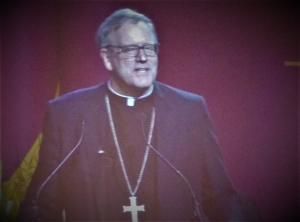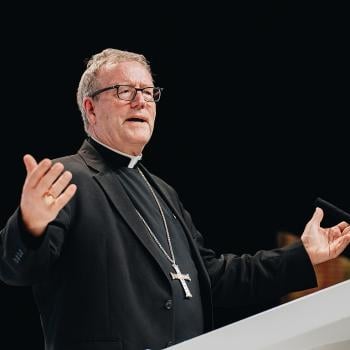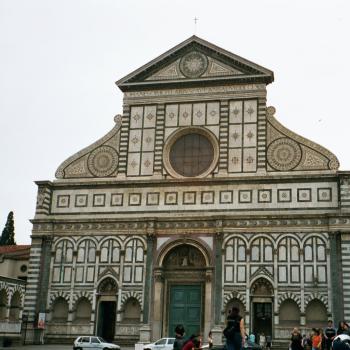
There is trouble brewing in the Catholic Church in the United States. Priests and bishops are not listening to the Pope, but rather, non-Catholic interests, like Jordan Peterson, who stand for principles which run contrary to Catholic teaching. Are they not paying attention? He has already indicated that he thinks Catholics should boycott Mass, which is why it was odd for Bishop Barron in 2019 to suggest that the solution to the problems in the church, the way to get people back to church, is to follow Peterson. Why would he promote Peterson when Peterson is not Christian, indeed, is either agnostic or an atheist? It seems Peterson’s interest in religion is only for taking those elements he likes and using them to promote his ideology while leading people to ignore or reject those elements which he ignores, and so following him is to encourage a heretical approach to the faith, one which picks and chooses what to believe like heretics do. How can Christians look up to Peterson he tells us justice is more important than mercy? The two should go together, but of course, they do not for him, because his view of justice is one of an authoritarian, legalistic understanding of justice, a position which ignores the point of justice itself. This is why, when he says he promotes justice, we should look closely at what he says, for we will find it is an anti-Christian position , for he will not look to and defend the dignity of others. It is one which cannot and will not accept social justice. Many of his supporters follow him because he give them justification for their biases, such as those who use his ideology to promote misogyny. Peterson is being used as a to get people to ignore the problems of the past so as to promote us all going back to the way things were, which of course, will not only bring back the problems of the past, but will make them worse than ever before (as is always the case when people are unable to learn from the mistakes of the past). That someone who is so strong in promoting Peterson is now the chair for Committee of on Laity, Marriage, Family Life, and Youth, where many of Peterson’s ideologies can cause the most damage, we must prepare ourselves for what might come out of the USCCB the next couple of years. We must look to the Catholic teaching which Peterson denies, and the promptings of the Pope, so we do not get distracted and think Peterson and his disciples properly represent authentic Catholic teaching.
Of course, the trouble with the USCCB is not with Barron and Barron’s promotion of Peterson. That is but a symptom of a greater problem. American bishops are ignoring, or worse, fighting the initiatives of Pope Francis. They showed their contempt in the way they ignored the Vatican’s pleas not to reinforce and continue to promote culture war division. It would appear that many bishops are more willing to listen to the Napa Institute than they are the Pope. Perhaps this is also the reason as to why they chose Bishop Steven Lopes, coming from the Anglican Ordinariate, as the next Chairman for the Committee of Divine Worship. Many people are confused as to why he was elected. Michael Sean Winters, for example, wrote: “Bishop Steven Lopes of the Ordinariate of the Chair of St. Peter, the canonical organization established for those former Anglicans who converted to Catholicism but wanted to maintain their different liturgical forms. Why he was nominated to lead the committee on liturgy I will never know, but Lopes narrowly won, 121-120.”[1]
If we consider what is going on between the USCCB, and many of its bishops, and the Pope concerning the issue of the liturgy, we could have our explanation. Lopes presents a way for those who oppose Pope Francis’ Traditionis Custodes to metaphorically thumb their nose at him. For, coming as he does from the Anglican Ordinariate, he stands with many of those former Anglicans who became Catholic because they thought their own communion was too “liberal” and “modernist,” that is, he presides over those who often hold ideals that connect with those who are critical of Traditionis Custodes.
The Pope wants to make sure the Latin Rite becomes unified under a common tradition and liturgy, one which is suitable for the present moment instead of trying to hold onto a form of the liturgy which does not fit the needs of the people today:
It belongs to the diocesan bishop, as moderator, promoter, and guardian of the whole liturgical life of the particular Church entrusted to him, to regulate the liturgical celebrations of his diocese. Therefore, it is his exclusive competence to authorize the use of the 1962 Roman Missal in his diocese, according to the guidelines of the Apostolic See. [2]
The USCCB seems to have indicated it has no interest in foresting that union but will instead seek after and deal with other liturgical matters instead. This way, those bishops who ignore the guidelines given by the Apostolic See, issuing blanket dispensations for those who would like to continue using other forms of the liturgy, will not likely get any pushback from the USCCB. When we see Traditionis Custodes, which has been proven to be necessary, being ignored, we should expect to see the US Catholic church to become more and more divided between those who follow the Pope and those who follow some modern Americanist ideology which threatens to bring schism to the church. Many of those who stand against the Pope like to claim tradition, but it is clear, they confuse the particular contextualization of tradition which established the Tridentine Liturgy as the tradition itself, an error which Nicholas of Cusa repudiated when he defended Pope Eugene IV against those who were critical of his own liturgical initiatives.
There is a serious conflict going on between various interests in the United States and Pope Francis, with many of the bishops in the US supporting those interests which stand against the Pope. Certainly, there is room for people to disagree with the Pope on prudential issues, but the disagreement goes further than prudence, but on principles. The USCCB has been promoting many who stand with those new, Americanist principles, putting them into positions of power and authority. Thankfully, not everyone they tried to place into positions over the conference were victorious. Metropolitan Borys Gudziak of Ukrainian Catholic Archeparchy of Philadelphia, was able to be elected Chair for the Committee on Domestic Justice and Human Development instead of Bishop Thomas J. Paprocki. This shows the United States Catholic Church is not yet entirely destroyed. There are seeds within it for its renewal. The Americanist ideology, though powerful, has not yet been fully embraced. Though many priests and bishops have been raised to accept it, there are still enough to see beyond it and seek to work with the Pope and the universal Catholic Church. And of course, there are the people, the lay faithful who see through the ideologies and keep speaking up when they are promoted, such as what happened when the National Black Sisters Conference, and others, spoke out against Archbishop José Gómez’s recent address where he attacked not only the work of social justice, but the people who have suffered at the hands of such injustice. The church is more than the priests and bishops, and so the voices rising up against the ideologies being promoted in the United States is a good sign that the Spirit still is at work in the church despite some of its leaders. There is hope. But that hope requires everyone to work together, to promote and emphasize what Americanist ideologies want to ignore. We can’t be silent now, if we want the stranglehold developing over American Catholics to be overcome.
[1] Michael Sean Winters, “No Explosion But Plenty Of Simmering Differences On Day 2 Of Bishops’ Meeting” in National Catholic Reporter (11-12-2021).
[2] Pope Francis, Traditionis Custodes. Vatican translation.
Stay in touch! Like A Little Bit of Nothing on Facebook.
If you liked what you read, please consider sharing it with your friends and family!













